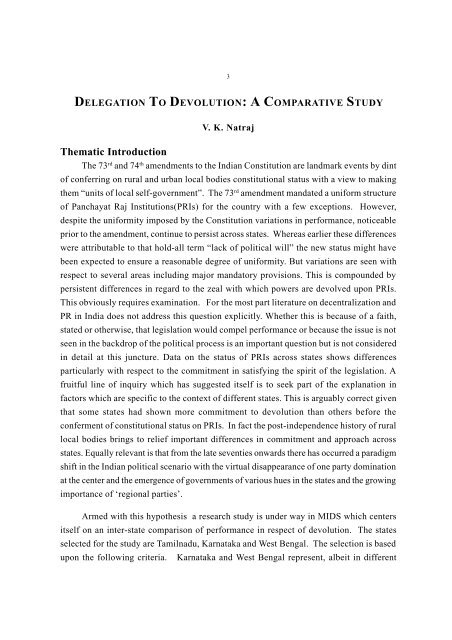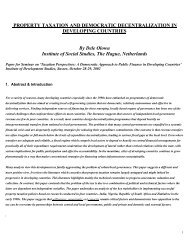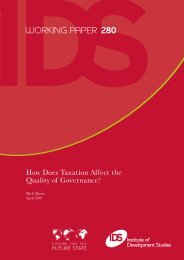View Article - Institute of Development Studies
View Article - Institute of Development Studies
View Article - Institute of Development Studies
You also want an ePaper? Increase the reach of your titles
YUMPU automatically turns print PDFs into web optimized ePapers that Google loves.
3DELEGATION TO DEVOLUTION: A COMPARATIVE STUDYV. K. NatrajThematic IntroductionThe 73 rd and 74 th amendments to the Indian Constitution are landmark events by dint<strong>of</strong> conferring on rural and urban local bodies constitutional status with a view to makingthem “units <strong>of</strong> local self-government”. The 73 rd amendment mandated a uniform structure<strong>of</strong> Panchayat Raj Institutions(PRIs) for the country with a few exceptions. However,despite the uniformity imposed by the Constitution variations in performance, noticeableprior to the amendment, continue to persist across states. Whereas earlier these differenceswere attributable to that hold-all term “lack <strong>of</strong> political will” the new status might havebeen expected to ensure a reasonable degree <strong>of</strong> uniformity. But variations are seen withrespect to several areas including major mandatory provisions. This is compounded bypersistent differences in regard to the zeal with which powers are devolved upon PRIs.This obviously requires examination. For the most part literature on decentralization andPR in India does not address this question explicitly. Whether this is because <strong>of</strong> a faith,stated or otherwise, that legislation would compel performance or because the issue is notseen in the backdrop <strong>of</strong> the political process is an important question but is not consideredin detail at this juncture. Data on the status <strong>of</strong> PRIs across states shows differencesparticularly with respect to the commitment in satisfying the spirit <strong>of</strong> the legislation. Afruitful line <strong>of</strong> inquiry which has suggested itself is to seek part <strong>of</strong> the explanation infactors which are specific to the context <strong>of</strong> different states. This is arguably correct giventhat some states had shown more commitment to devolution than others before theconferment <strong>of</strong> constitutional status on PRIs. In fact the post-independence history <strong>of</strong> rurallocal bodies brings to relief important differences in commitment and approach acrossstates. Equally relevant is that from the late seventies onwards there has occurred a paradigmshift in the Indian political scenario with the virtual disappearance <strong>of</strong> one party dominationat the center and the emergence <strong>of</strong> governments <strong>of</strong> various hues in the states and the growingimportance <strong>of</strong> ‘regional parties’.Armed with this hypothesis a research study is under way in MIDS which centersitself on an inter-state comparison <strong>of</strong> performance in respect <strong>of</strong> devolution. The statesselected for the study are Tamilnadu, Karnataka and West Bengal. The selection is basedupon the following criteria. Karnataka and West Bengal represent, albeit in different





